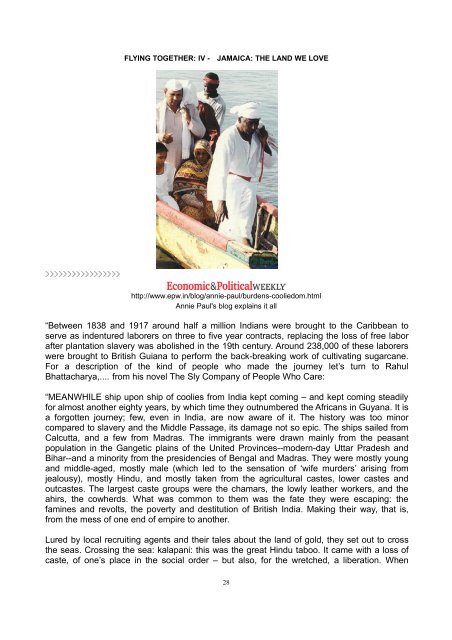Flying Together 4-Jamaica
Create successful ePaper yourself
Turn your PDF publications into a flip-book with our unique Google optimized e-Paper software.
FLYING TOGETHER: IV -<br />
JAMAICA: THE LAND WE LOVE<br />
>>>>>>>>>>>>>>>>>http://www.epw.in/blog/annie-paul/burdens-cooliedom.html<br />
Annie Paul's blog explains it all<br />
“Between 1838 and 1917 around half a million Indians were brought to the Caribbean to<br />
serve as indentured laborers on three to five year contracts, replacing the loss of free labor<br />
after plantation slavery was abolished in the 19th century. Around 238,000 of these laborers<br />
were brought to British Guiana to perform the back-breaking work of cultivating sugarcane.<br />
For a description of the kind of people who made the journey let’s turn to Rahul<br />
Bhattacharya,.... from his novel The Sly Company of People Who Care:<br />
“MEANWHILE ship upon ship of coolies from India kept coming – and kept coming steadily<br />
for almost another eighty years, by which time they outnumbered the Africans in Guyana. It is<br />
a forgotten journey; few, even in India, are now aware of it. The history was too minor<br />
compared to slavery and the Middle Passage, its damage not so epic. The ships sailed from<br />
Calcutta, and a few from Madras. The immigrants were drawn mainly from the peasant<br />
population in the Gangetic plains of the United Provinces--modern-day Uttar Pradesh and<br />
Bihar--and a minority from the presidencies of Bengal and Madras. They were mostly young<br />
and middle-aged, mostly male (which led to the sensation of ‘wife murders’ arising from<br />
jealousy), mostly Hindu, and mostly taken from the agricultural castes, lower castes and<br />
outcastes. The largest caste groups were the chamars, the lowly leather workers, and the<br />
ahirs, the cowherds. What was common to them was the fate they were escaping: the<br />
famines and revolts, the poverty and destitution of British India. Making their way, that is,<br />
from the mess of one end of empire to another.<br />
Lured by local recruiting agents and their tales about the land of gold, they set out to cross<br />
the seas. Crossing the sea: kalapani: this was the great Hindu taboo. It came with a loss of<br />
caste, of one’s place in the social order – but also, for the wretched, a liberation. When<br />
28


















